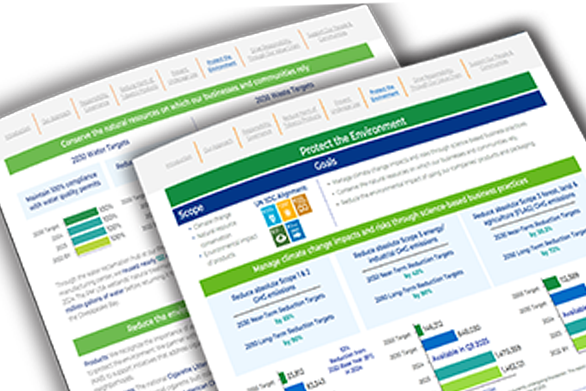
Environmental Impact of Products
Litter Prevention
Cigarette butts are one of the most littered items in the world, which is why we have several programs and community partnerships that work to prevent our products and packaging from becoming litter. We work to inspire and empower adult smokers 21+ to protect the land that we all call home by responsibly disposing their cigarette butts. In 2024, Philip Morris USA offered adult smokers 21+ the opportunity to redeem Marlboro® Rewards* points for litter devices and complimentary waste recycling pouches in partnership with Keep America Beautiful® (KAB) to recognize America Recycles Day and to raise awareness and encourage cigarette waste recycling.
We also partner with KAB to prevent litter. In 2024, Altria celebrated 22 years of partnership with KAB supporting the Cigarette Litter Prevention Program (CLPP). KAB offers grants through CLPP to help communities and local KAB chapters install cigarette butt collection receptacles in highly trafficked areas to collect cigarette waste.
Our Progress
Since 2002,
Altria has granted
$18
million
to Keep America Beautiful
in support of their litter
prevention programs.
In 2024, 10 new communities received grants through our support of the CLPP. Since our support began in 2002, more than 1,850 communities participate in the program. After implementation, KAB documented an average of 62 percent reduction in cigarette butt litter in new participating communities. Our CLPP and Great American Cleanup funding has reached more than 5 million individuals and supported cleanup activities in nearly 500 public spaces.
KAB encourages enforcement of litter laws, raises awareness about the issue using public service messages, places cigarette receptacles at transition points such as entrances to public buildings, distributes portable ashtrays to adult smokers and organizes community litter clean-ups.
Sustainable Products & Packaging Materials
Materials used in our products and packaging, such as paper and plastic, can have negative environmental impacts. According to KAB, improperly disposed plastics can end up in our waterways and natural landscapes where they can degrade into microplastics, leach toxic chemicals and be ingested by animals.
Paper and pulp-based packaging is made from timber, a high-risk commodity with the potential to drive deforestation and biodiversity loss. At Altria, reducing the environmental impacts of our products means being thoughtful about the materials we use. We continue to explore ways we can use more sustainable materials in our products and packaging and set a new target to commit to no deforestation across primary deforestation-linked commodities by 2025.
Today, all the plastics used in our products and packaging are fossil-fuel derived. In support of our environmental targets, we are exploring sustainable plastic alternatives with lower carbon footprints and reduced waste at end-of-life. We are also actively preparing to comply with recently-enacted state extended producer responsibility laws, which aim to reduce the use of plastics and increase recyclability of packaging materials. View Progress







 Biodegradable plastics can be broken down by microorganisms into natural by-products under certain conditions. Bioderived plastics are made from plants including corn, sugar, and plant-based oils. Recycled content plastics are made from recycled plastic material like plastic bottles.
Biodegradable plastics can be broken down by microorganisms into natural by-products under certain conditions. Bioderived plastics are made from plants including corn, sugar, and plant-based oils. Recycled content plastics are made from recycled plastic material like plastic bottles.